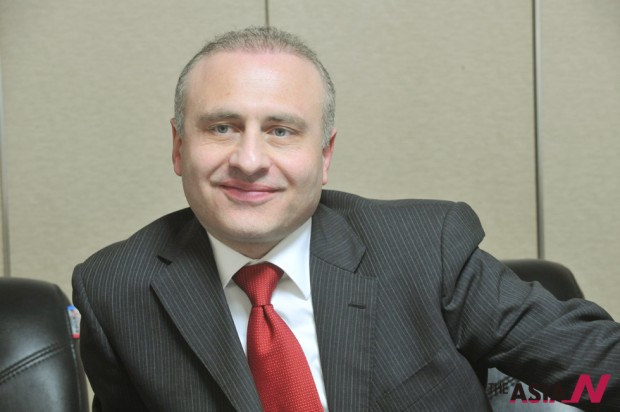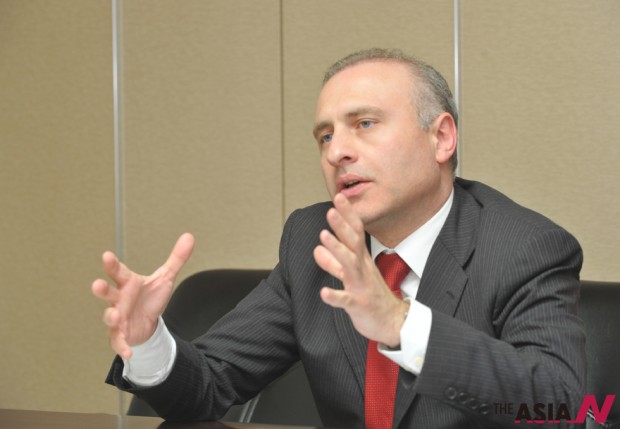‘Wine country’ Georgia eyes closer relations with Korea
Interview with the Georgian Ambassador Nikoloz Apkhazava
Georgia is a country so far from Korea, but one with many similarities. Did you know that most nationalities can visit Georgia without a visa for 360 days? This can be seen as an extension of Georgia’s history of tolerance. In an interview with The AsiaN earlier this month at the Georgian Embassy in Seoul, Georgian Ambassador to Korea, Nikoloz Aphkhazava, tells us about the new stage in Korea-Georgia relations.
Please briefly introduce Georgia to us.
Georgia is an ancient country in Eastern Europe with a population of 4.5 million. The official religion is Orthodox Christianity and it was the first Eastern Orthodox state since the 4th century. We have had our own alphabet since the 4th century BC.
Our country was given the name “Georgia,” meaning agriculture in Greek. When the Greeks came to Georgia, they called it the “land of tillers” as our agriculture was so developed.
Georgia has been very famous for its wine. It was confirmed a few years ago that Georgia is the cradle of wine, with a history going back more than 7,000 years. We have 500 types of grapes endemic to Georgia and 100 types of wine. Naturally carbonated mineral water is also well known.
Georgia is a very tolerant, multi-ethnical country with people of more than 80 ethnicities. We have certain ethnic groups unique to Georgia. The many ethnic groups have been living in Georgia for centuries without conflict and no one bothers them. You can see churches, synagogues and mosques 100 meters from each other.
Even though Georgia is not very rich in minerals, it is important as a “transport corridor” connecting Central Asian countries to Europe.
In 2008, we had a war with Russia and now Russia is occupying 20 percent of our land and we ironically have 500,000 Georgian refugees living in Georgia. On August 12, 2008, we signed a six-point ceasefire agreement with Russia, but Russia has not been acting according to the treaty.
No international organizations can enter these Russian occupied zones. We are very concerned about their living conditions.
Last year, about 4 million tourists visited Georgia, almost equivalent to our population. Tourists come from everywhere, but the majority is from Europe. 2,500 tourists came from Korea last year. The Koreans who visit seem very satisfied as they want to return or go a third time.
80 percent of the country is mountainous. There are special wine tours in the wine production regions, where you can actually pick grapes in the morning, participate in the wine making process and drink the wine from the grapes you picked. You can go in the morning to ski in the mountains in the north and then in one hour you can be on the beach by the Black Sea. We also have a desert and a safari for hunting. There is everything for everybody. Many tourists come and see Stalin’s hometown as well as the old churches. The Georgian people are friendly and hospitable.
Please tell us about Georgia-Korea bilateral relations.
The Embassy of Georgia was established in August 2011 in Seoul and I came to Korea in February 2012 as the first resident ambassador. Only a month after I arrived, a big delegation from Georgia including the President of Georgia and three ministers came to attend the Nuclear Summit. At the time, Georgian President Mikheil Saakashvili met with Former President Lee Myung-bak at the blue house. This was the first time for a Georgian head of state to visit Korea since the two countries started diplomatic relations in 1992.
Since then, we have received many delegations from Georgia including numerous high-level delegations. We held business conferences here and 40 Korean businessmen also went to visit Georgia.
Since then gradually, yet steadily, relations have been growing. Last year we celebrated 20 years of bilateral relations between our countries. In commemoration, we had Korean culture days for the first time in Georgia. There was a movie festival, photo exhibition, and a Korean fusion girls’ band called Queen came and performed. The new Korean ambassador to Georgia also attended.
There are plans to establish an embassy in Georgia either this year or next year. We have got the green light to go and arrange for the embassy, but it is taking a little time due to the change in governments in both countries.
Chaebols like Samsung, Hyundai and K-Water are present in Georgia. Most people know Samsung, Korean cars and about the situation with North Korea. Korean movies are also quite popular. People in Georgia know more about Korea than Koreans about Georgia. I am quite happy when I meet a Korean who knows where Georgia is located.
Recently, we signed the first official treaty between our two countries allowing Georgia officials and diplomats to come to Korea without a visa for 3 months.
What are some areas where Georgia and Korea can strengthen ties and partnerships in?
Establishing a legal base between our two countries is one of our main goals this year. Treaties between two countries make it a lot easier to cooperate in various fields. We would like to make treaties in areas of culture, tourism, youth, trade, and maritime cooperation.
Georgia is still an unknown country to many Koreans and furthermore, Korean businessmen. Georgia has a very attractive environment for business and trade with many opportunities. The process of registering a business is also relatively simple. Reduced from 21 steps, now you can register your business in 15 minutes online by completing 6 steps.
Trade is an area that can definitely grow. Koreans can also participate in the energy sector.
Last October, the elections brought a new administration in which the opposing party came to power. On March 7, 2013 the Georgian Parliament adopted a special resolution to again strive for Georgia’s full integration into the EU and NATO. Such integration will bring new opportunities for Georgia, allowing it to trade freely.
How is your daily schedule like?
Our office hours are from 9am to 6pm, but I rarely finish work at 6pm. We are a small embassy with two local staff and one financial manager. Every day is different.
There is so much work to be done especially as we are still in the process of establishing ourselves. Luckily, we have already passed the most difficult period, but something new comes up every day. I have anywhere from two to six appointments a day.
Local Koreans often visit our embassy to learn more about Georgia and get tips on where to go and what to do when traveling there.
Just the other day I had a meeting with KBS and they want to shoot a documentary about tourism, people and the landscapes in Georgia this April.
How many Georgians are living in Korea and what are their occupations?
The Georgian community is very small in Korea. There are a total of 8 people excluding the embassy staff. Most of them are students and one is married to a Korean. Most of them are in their 20’s. They all speak Korean well and seem satisfied with their life in Korea.
What is your impression of the Korean people?
The Korean people are kind, friendly and helpful. They are also very respectable as they developed their country from scratch within 20 to 30 years to be the 15th largest economy in the world. It has been relatively easy to work and communicate with Korean people as they are open and open-minded.
What is most impressionable about Korea?
So far, I have been quite impressed by the state institutions, which work very well and effectively. The system and institutions allow for good communications. It is easy to make appointments with government officials as well as private agencies. I hope the smooth flow of communications will continue with the new administration.
What are some similarities between Georgia and Korea?
I would say both nations’ people are proud and proud of their histories. Both Georgia and Korea are small countries surrounded by big countries. They have been trying to survive and remain independent, which they finally managed. Both countries experienced colonial rule. Korea is divided and Georgia is a divided nation with 20 percent of its land occupied.
Apkhazava enjoys reading, going fishing and spending time with the diplomatic circle in his free time. Before coming to Korea, he was the minister-counselor at the Embassy of Georgia in Japan.


























































